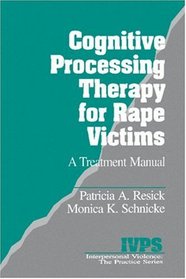Search -
Cognitive Processing Therapy for Rape Victims : A Treatment Manual (Interpersonal Violence: The Practice Series)
Cognitive Processing Therapy for Rape Victims A Treatment Manual - Interpersonal Violence: The Practice Series
Author:
"This manual has a great deal to offer. It is clearly written and provides a wealth of information regarding the assessment and treatment of rape victims. Unlike a number of manuals, it presents a well-conceived rationale and a step-by-step approach with objectively stated procedures and relevant examples. It also provides empirical data to supp... more »
Author:
"This manual has a great deal to offer. It is clearly written and provides a wealth of information regarding the assessment and treatment of rape victims. Unlike a number of manuals, it presents a well-conceived rationale and a step-by-step approach with objectively stated procedures and relevant examples. It also provides empirical data to supp... more »
ISBN-13: 9780803949027
ISBN-10: 0803949022
Publication Date: 6/2/1993
Pages: 192
Rating: ?
ISBN-10: 0803949022
Publication Date: 6/2/1993
Pages: 192
Rating: ?
0 stars, based on 0 rating
Publisher: SAGE Publications
Book Type: Paperback
Other Versions: Hardcover
Members Wishing: 1
Reviews: Amazon | Write a Review
Book Type: Paperback
Other Versions: Hardcover
Members Wishing: 1
Reviews: Amazon | Write a Review
Genres:
- Health, Fitness & Dieting >> Mental Health >> Abuse & Self Defense >> Rape
- Health, Fitness & Dieting >> Relationships >> Interpersonal Relations
- Health, Fitness & Dieting >> Relationships >> Mate Seeking
- Health, Fitness & Dieting >> Psychology & Counseling >> Neuropsychology
- Nonfiction >> Social Sciences >> Sociology >> General




